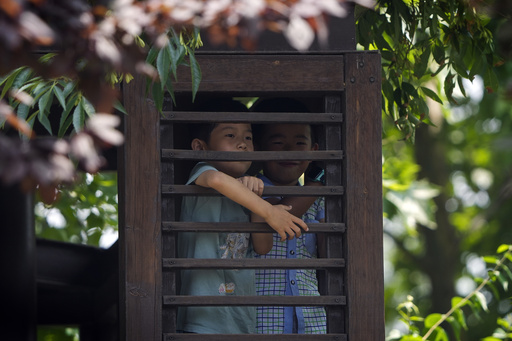TAIPEI, Taiwan (AP) — Across the Chinese diaspora, racing in dragon boats has been a tradition reaching back thousands of years.
But change is afoot, most recently in central Taiwan where the races were switched to the evening to take advantage of cooler temperatures, a refreshing breeze and the sight of the boats lit up with LED lights running the length of the low-lying watercraft.
A drummer pounds out a rhythm behind the elaborately carved dragon head in the bow, while a navigator sits in the stern, where a tail rises to complete the look of the mythical animal, a traditional Chinese harbinger of prosperity and good luck.
It is mainly an amateur sport and crews are formed among groups of neighbors and co-workers. Emily Lin, 31, who works as a sales executive in Changhua county, said training sessions at a local junior high school were an excellent way to strengthen friendships outside of work.
“This dragon boat race allows us to meet, exchange and take part in something,” Lin said Monday following qualifiers the previous night.
Daytime racing means dealing with the intense central Taiwan sun reflecting off the river, leaving you feeling unwell, said Chen Ta-tzung, a 28-year-old machinery maintenance specialist.
“But in the evening, you don’t have the sun,” Chen said.
“When we focus on rowing during the race, we cannot enjoy the beautiful scene. But when we row back, we can really enjoy the beautiful sights,” he added.
This year’s races hold a special meaning for many participants and observers as they are the first after a three-year break because of the COVID-19 pandemic.
The sizes of the boats vary and the numbers of rowers can range from 10 to 20 or more. The festival generally falls at the start of June based around the summer solstice according to the Chinese lunar calendar.
In recent decades, the sport has spread in popularity around the world and standards have been imposed on rules and equipment, including the size of paddles and requirements that the drummer, playing a similar role to the coxswain in college and Olympic rowing, maintains a constant beat.
“Racing at night is special for rowers,” said Huang Yi-kai, 21, who is a coach for standup paddleboard rowers. “This allowed rowers to focus on the moment. It’s a refreshing experience.”
Dragon boat races are also being held in Hong Kong and Macao, as well as around mainland China, where lax safety standards have occasionally led to deadly accidents. At least one person was killed after a dragon boat capsized in the southwestern Chinese city of Chongqing on Sunday, the local government reported.
At a competition on a canal in the east of Beijing on Monday, participant Shi Shulei cheered the event as a celebration of traditional Chinese culture, devoid of commercial or foreign influences.
“Nowadays people celebrate many festivals invented by merchants or by other countries. We sometimes forget about Chinese traditional festivals. This event should be promoted because it helps to rejuvenate Chinese traditional culture,” Shi said.
Twenty-five teams representing companies, universities and residential compounds raced over the 200-meter (650-foot) canal, where two boats collided in the preliminary round after one of them veered from its lane. The 24 participants were swiftly rescued from the water and no one was reported injured, while organizers called for more life vests and rescue boats.
Despite temperatures of 35 degree Celsius (95 degrees Fahrenheit), crowds from around the city of more than 20 million lined the canal and cheered from a reproduced Chinese ship from the imperial era.
In Hong Kong, a former British colony where political and civil liberties have been increasingly restricted in recent years, the emphasis among racers was on working together to achieve a common goal.
“Dragon boat is a team sport. It’s important we share a team spirit,” said Andy Ng, the coach of a local team. “Each member strives with the same objective, which is being the fastest to the finish point. Everyone in my team enjoys it and we enjoy the workout together.”
The races are connected to the tale of Qu Yuan, a loyal adviser to a Chinese emperor some 2,500 years ago who drowned himself in a river after his sage advice was rejected. According to legend, to prevent fish from eating his body, supporters tossed in rice cakes, a tradition that continues to this day as observers mark the fifth day of the fifth lunar month by eating sticky rice dumplings.
___
Associated Press video journalists Wayne Chang in Beijing and Alice Fung in Hong Kong contributed to this report.
This website uses cookies so that we can provide you with the best user experience possible. Cookie information is stored in your browser and performs functions such as recognising you when you return to our website and helping our team to understand which sections of the website you find most interesting and useful.
